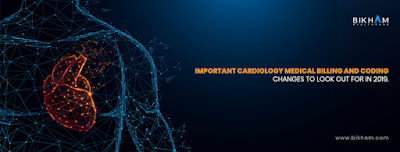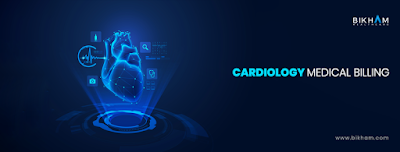Cardiology medical practices
offer a variety of services like invasive procedures and interventions to
patients in different settings. Service charges in this specialty are dealt
with differently, depending upon the place of service. Now, the Place of
Service can be different for different situations like Surgery Center, Hospital,
Doctor’s clinic, hospice care, skilled nursing facility or some other place.
Keeping up with the changes and
discovering the best practice has become more important than ever. Billing
cardiology claims accurately, requires a working knowledge of cardiology
specific CPT and diagnosis codes, current coding rules, and ever-changing
compliance standards. A minor mistake in cardiology medical billing and coding
can invite denials and adversely affect your practice revenue.
Cardiology Medical Billing and Coding Changes
Though more than 450 changes were
introduced in the 2019 ICD-10 updates, there were only a few changes or
revisions that affected Cardiology. However, it is still imperative that you
familiarize yourself with them. Here we have compiled some of them for you to
get a hang of it.
Changes in Cerebral Infarction
New codes were introduced to
cerebral infarction category I63. Following are some of them.
·
I63.81 – Cerebral infarction due to occlusion or
stenosis of the small artery (lacunar infarction also included)
·
I63.89 –Cerebral infarction
These codes might be required to
report with an additional code, R29.7, indicating the NIHS (National Institute
of Health Stroke) scale for the patient, when applicable.
Introduction of New Subcategory in I67
Cerebrovascular Disease, category
I67 was introduced with a new sub-category for hereditary cerebrovascular
diseases. The new codes in this subcategory were:
I67.850, for cerebral autosomal
dominant arteriopathy, subcortical infarcts, Leukoencephalopathy with CADASIL.
I67.858, for other hereditary
cerebrovascular diseases.
With the introduction of these
new subcategories, a new “code also” note is also present that instructs
reporting of associated diagnoses like vascular dementia, recurrent seizures,
and cerebral infarction with I67.
Other revisions
T46.4X, for
Angiotensin-converting enzyme inhibitors.
122.8, for subsequent posterior
transmural myocardial infarction.
197.64, for post-procedural
seroma of the circulatory system.
T81.11, for post-procedural
cardiogenic shock.
Combination Codes
Cardiology Medical Billing and
coding also saw the introduction of combination codes for different cardiology
conditions. Therefore, it is important to ensure that they are also used whenever
required. Also, using terms like “Use additional code”, “Code Also”, “Code
First”, etc. helps generate a complete picture.
Outsourcing Cardiology Medical Billing
With the inception of these codes changes, it has become important for cardiologists to take special care while
dealing with cardiology medical billing. Cardiology medical billing comes with
complex contractual adjustments and procedure rules that undergo changes
frequently.
Choosing to outsource cardiology
medical billing will allow you to focus on the core practice aspects and
deliver excellent healthcare services. We at Bikham Healthcare, are dedicated
to helping cardiologists and cardiology practices run their facilities with
ease under full HIPAA compliance and data security standards.
Contact Bikham Healthcare today
to learn more about our medical billing services.

